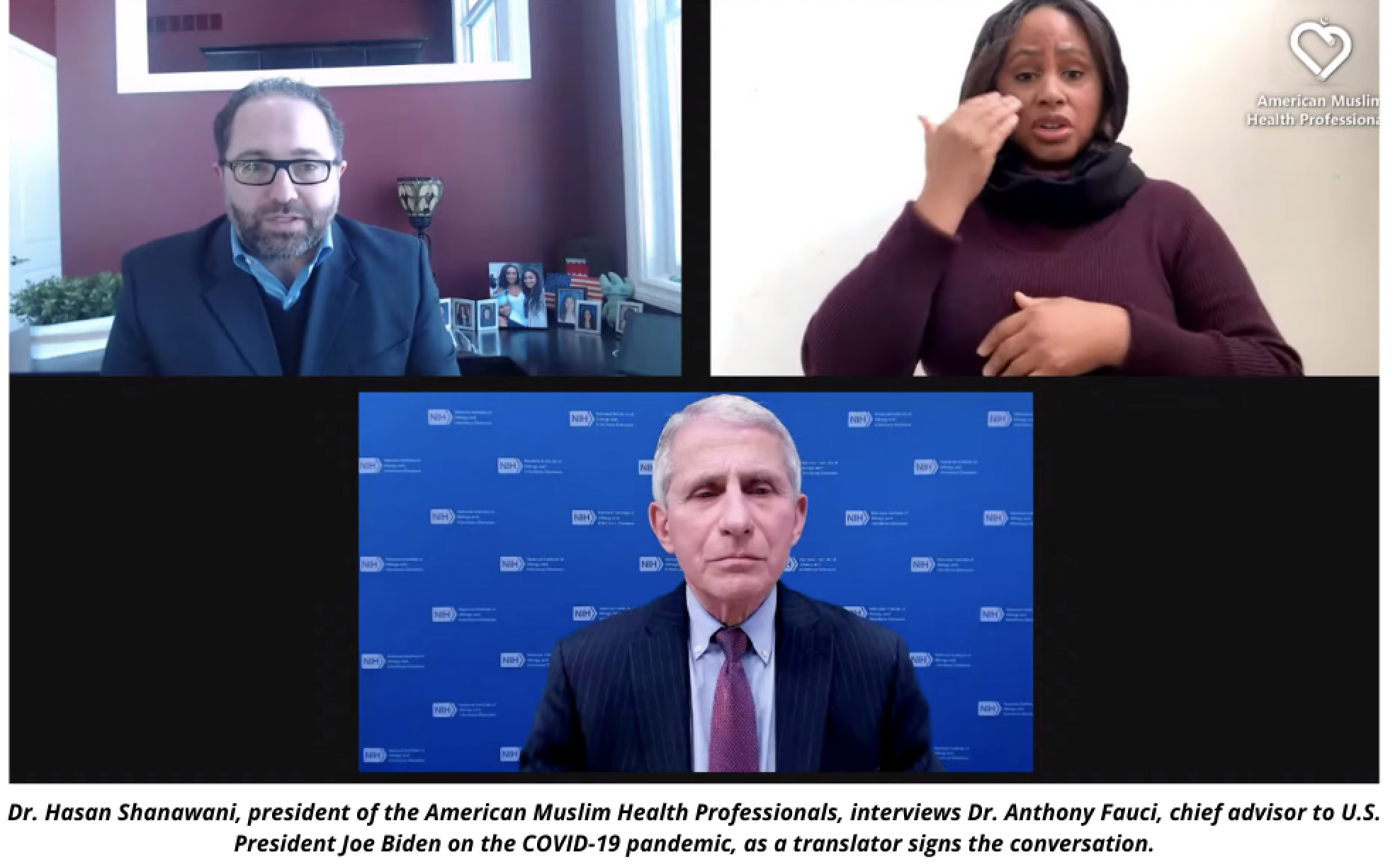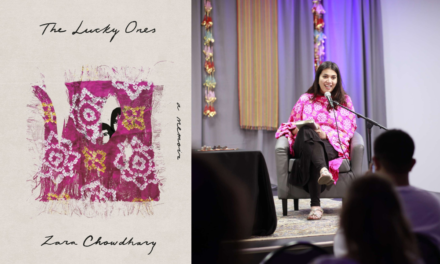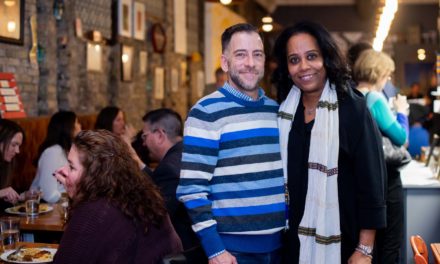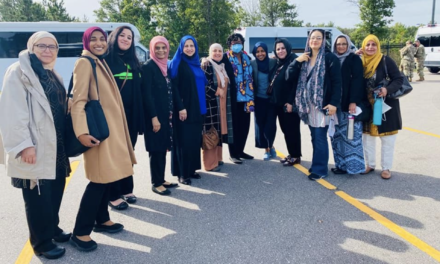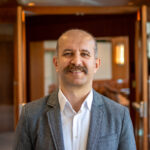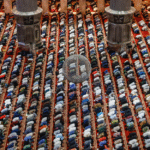Photo Credit ©:
AMHP, Patch.com & Norwoodnews
With nearly half a million lives lost to COVID-19 in the United States, the virus has not only hurt our physical health but also taken a toll on our mental, social, financial, occupational and even spiritual health. New vaccines offer hope.
Yet, many worry their development was rushed, perhaps, say some, to profit the pharmaceutical industry.
“People are scared, including my own mom,” said Dr. Hasan Shanawani, president of American Muslim Health Professionals, a national non-profit organization made up of professionals and students from diverse sectors of the healthcare industry. The AMHP’s mission is to strengthen the impact of Muslim health professionals to improve the health and wellness of all Americans. “My colleagues express fear that this vaccine is new and experimental,” he added.
AMHP hosted “A Conversation on COVID-19 Vaccines with Dr. Anthony Fauci and the American-Muslim Community” last week as part of its effort “to dispel misinformation and educate the community about the safety and efficacy of these vaccines,” an AMHP email to subscribers states. Fauci is the chief advisor on the COVID-19 pandemic to U.S. President Joe Biden and director of the National Institute of Allergy and Infectious Diseases since 1984. He is considered a world leader in addressing the pandemic.
The Wisconsin Muslim Journal is sharing paraphrased highlights of the conversation between Drs. Fauci and Shanawani, who discussed the development of the COVID-19 vaccine, an answer for skeptics and a glimpse into the future.
The full webinar is available on the AMHP website and the organization’s Facebook page.
On vaccine development
Shanawani: Some people think the vaccines are the result of 10 months of research. Give us some history.
Fauci: From the time the Chinese put the sequence of the virus on a public database, on Jan. 10, 2020, to the time we ultimately had vaccine going into the arms of individuals, was literally 11 months after the virus was first identified. It was the fastest done in history.
But it is important to bring out is that this was accomplished not by comprising safety or scientific integrity. This is the result of work that has been done for at least a decade. The speed is a result of scientific advances, not of cutting corners or being recklessly fast.

Dr. Hasan Shanawani
On new variants
Shanawani: We are hearing about the new variants. Are the mutations and the drifting of this virus different from other viruses we have seen before, like influenza?
Fauci: Not at all. But when they show functional relevance, we need to pay attention.
The variant in the UK is showing an increase in the capability of transmitting from person to person, but it does not seem to escape the impact of the vaccines we are currently using. The variant in South Africa is more ominous. It is able to elude some of the antibodies used for treatment and to diminish, to some extent, the capabilities of the antibodies induced by the vaccines to suppress the virus.
These are things we need to take seriously because they will inform things we must do like, for example, developing a booster shot that represents the actual variant in the community.
On the relationships between government, universities and industry
Shanawani: As a leader in research, what can you say about the relationships between government, research institutions and industry?
Fauci: The relationship between the National Institutes of Health and universities is how we fund peer-reviewed research. The NIH is the largest research-funding organization in the world by far, with a budget of over $42 billion. Most of the money that goes out from the NIH goes to grantees and contractors in universities and medical centers throughout the country and the world.
We have the same sort of collaborative interaction with industry, particularly the pharmaceutical industry, that is shown by the collaborations that have gone into the development of vaccines for COVID-19, two of which have already received emergency authorization in the U.S., the Moderna and Pfizer vaccines.
On the impact of social media
Shanawani: What are the impacts of social media on sharing health information?
Fauci: Social media’s impact has both positive and negative aspects. The positive aspects are that good, correct, informative data and evidence are made available to the public very quickly. That is characteristic of the last decade or so.
However, the availability of input into social media by anyone and everyone also has its downside in that often misinformation is spread through that medium.
What we try to do in the scientific community is speaking through the appropriate channels. Some of that is social media, some is peer-reviewed scientific journals and some are scientific conferences and meetings in which people exchange information. All in all, things are working reasonably well.

Dr. Anthony Fauci
On healthcare equity
Shanawani: American Muslims are a diverse community. Thirty percent of American Muslims self-identify as African Americans and that community, in particular, has suffered a lot. Thirty percent are of South Asian origin and 15% are people like myself, children of Middle Eastern immigrants. What is being done to ensure there is equitable access to the vaccine for minority groups?
Fauci: We have made a major effort that is ongoing for equity, namely getting both accessibilities to research protocols, which is clinical trials, and accessibility to products when they are shown to be safe and effective.
If one goes back to the beginning of the 30,000-person and 44,000-person clinical trials of Moderna and Pfizer respectively, we put a major effort into getting representation of minority communities, particularly brown and black people. With Moderna, we got 10% African Americans. We were aiming towards 13%, but getting a little over 10% was good. We did better with the LatinX community. A little more than 18% of the U.S. population is Latinx. And more than 21% of the people in the trials were LatinX.
Now that a vaccine is available in an emergency use authorization, the task is to make sure the vaccine gets distributed equitably to minority populations. In fact, President Biden has formed an equity task force that is responsible for making sure we have equitable access to things like vaccines to all people in the country – Muslim Americans, whites, Blacks, the entire demographic display of people.
On addressing the skeptics
Shanawani: What advice would you give to experts addressing the public with people in the room who don’t trust the scientific community?
Fauci: First of all, you have to respect people’s skepticism and don’t immediately criticize them for it. You need to embrace them and engage them. That is what I have tried to do over the last four decades.
When people have skepticism about the science, you have to convince them, and I think it is easy to do. Show them that the process is both transparent and independent, and not influenced by non-scientific factors.
When people ask how we know the vaccines are safe and effective, have the patience to explain the process. The decision to make vaccines available was the result of well-organized 30,000 and 44,000-person clinical trials; that the analysis of the results are in the hands of independent bodies called “data and safety monitoring boards.” When they saw the data was strong enough to make a determination, they allowed the data to be seen by the companies, who then presented the data to the U.S. Food and Drug Administration.
There, career scientists examined the data and, in association with their independent advisory committees, determine if the vaccine is appropriate to be distributed throughout the country. That is exactly what happened with the two vaccines that have been made available through emergency authorization.

On the future of COVID-19 vaccinations
Shanawani: Will the COVID-19 vaccination be a one-and-done or will it be a vaccine we will take every year, like the Flu shot?
Fauci: The answer is we don’t know yet. We don’t know the durability of the vaccine. We are going to have to observe it over a period of a few years, if not longer.
Another factor that comes into play is how much mutation and drift will occur in the virus itself. And this relates to the fact that even if we get a good majority of people in the U.S. vaccinated, as long as there is a significant amount of COVID-19 throughout the world, there will continue to be evolving mutations and new variants. If that is the case, we may have to vaccinate people with updated vaccines to keep up with the evolution of this virus.
On post-pandemic life
Shanawani: Do you think we will ever go back to the old normal or are masks here to stay, like seatbelts and bike helmets?
Fauci: I think we will wear masks until the degree of the virus is so low that it is not a threat; I think we will be wearing masks for a considerable period of time.
It might be that we accept to wear masks the way people in Asian countries do. They wear masks when they are out and are not feeling well or they feel there is a lot of illness in the community.
On a career in health professions
Shawani: If your grandchild came to you for advice, what would you tell her to study?
Fauci: If my grandchild had any propensity towards science, I would say to her that the opportunities, gratification and ability to make major contributions to society are extraordinarily high when you think of biomedical science or even some of the physical science. It is the discovery of the unknown and doing it for the betterment of mankind. I would encourage her, if she has any inclination to go into the science, that it almost certainly would be a very gratifying career.
